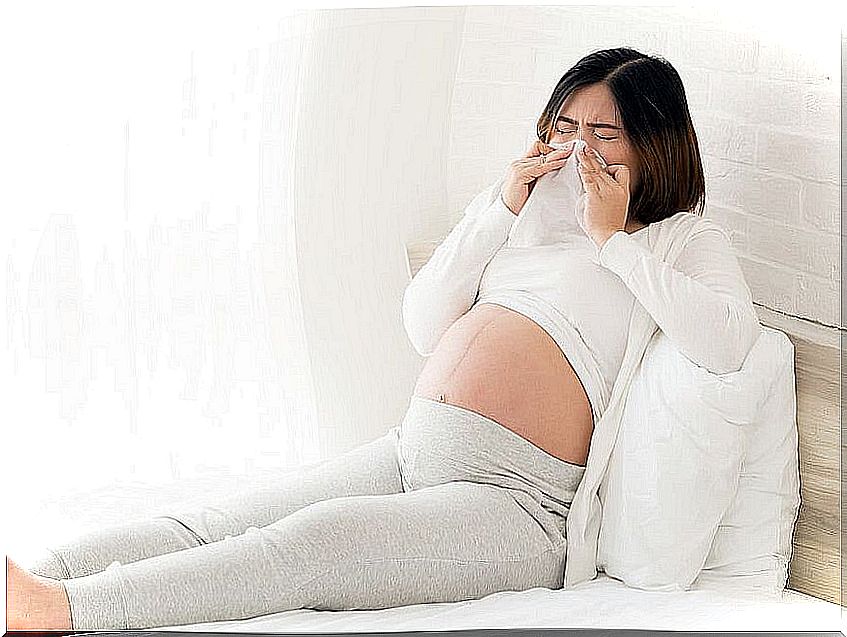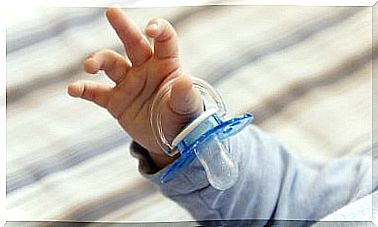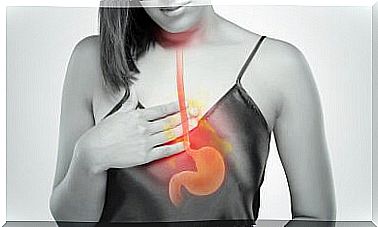5 Tips To Combat Sinusitis In Pregnancy
Symptoms of sinusitis include pain around the eyes and nasal congestion. If we add the symptoms of pregnancy and the limitation when taking medicines, it can become something really uncomfortable. Take note of the tips.

Sinusitis is an inflammation of the sinuses. It is a localized infection in the hollows of the bones of the nose where the air passes when breathing. Therefore, among its symptoms, are nasal congestion and pain in the area around the eyes. This is especially annoying when it comes to sinusitis in pregnancy.
If we add the discomfort and limitations of pregnancy, the condition can make the pregnant woman feel even worse. Therefore, today we propose 5 tips to combat sinusitis during pregnancy.
What is sinusitis?
As we indicated previously, it is an inflammation of the paranasal sinuses. In turn, it can be caused by various causes such as allergies, infection or nasal problems, among others.

Normally, it differs between several types of sinusitis:
- Acute, the duration of which is more or less 4 weeks.
- Subacute, when it lasts from 4 to 12 weeks.
- Chronic, when it lasts for more than 12 weeks, months or even years.
- Recurring, if it appears several times throughout a year.
On the other hand, the characteristic symptoms are localized pain around the eyes and cheeks and nasal congestion. However, other symptoms may occur, such as:
- Cough.
- Fever.
- Post-nasal drip.
- Fatigue and weakness
Diagnosis is made after a medical examination of the nose and face, and evaluation of symptoms. Once detected, the doctor may prescribe antibiotics, decongestants and analgesics as treatment.
However, in the case of pregnant women, pharmaceutical treatments are often not a possibility. Indeed, a pregnant woman should avoid taking medications, so she should strictly limit herself to the indications of her doctor.
Rhinitis of pregnancy
On the other hand, we should not confuse sinusitis with pregnancy or gestational rhinitis. Indeed, while sinusitis is the inflammation of the bone cavities, the paranasal sinuses, rhinitis is the inflammation of the nasal mucosa. Therefore, sinusitis and rhinitis are two different conditions that should not be confused.
Likewise, there is a type of rhinitis called “pregnancy” or “gestational”, since it usually occurs during pregnancy, disappearing after delivery. Symptoms include nasal congestion, itching, sneezing, and coughing.
Although its causes are unknown, it does not represent any danger to the pregnant woman or the pregnancy. However, it is an annoying condition that can even prevent you from sleeping well. This, added to the symptoms of pregnancy such as fatigue, headaches or nausea, can cause great discomfort for the pregnant woman.
Remedies to combat sinusitis during pregnancy
Since a pregnant woman should never self-medicate and should avoid taking medicines without medical supervision, it is perhaps time to consider some natural tips that can help her feel better and relieve the annoying and painful symptoms of sinusitis.
Also, a pregnant woman should avoid taking natural remedies based on plants, herbs, or alternative medicine. For that reason, the advice we offer you below is absolutely natural and does not endanger pregnancy.
Drink a lot of liquids
Treatment of sinusitis is primarily symptomatic. Therefore, one of the main tips is to maintain good hydration. Thus, during pregnancy, it is recommended to drink plenty of water and natural juices. In this way, nasal secretions can flow more easily, relieving congestion.

Raising the pillow when sleeping
Posture at bedtime can cause you to cough more or less. Therefore, one of the tips to relieve sinus symptoms at night is to use a pillow so that the head is slightly elevated.
This will make breathing easier and mucus will flow more easily, reducing coughing and the need to sneeze.
Steam to relieve sinusitis in pregnancy
On the one hand, a humidifier can be used at night, so that the nasal passages are cleared.
However, another option is to bring water to a boil and, once removed from the heat, place a towel over your head and lean over the pot to breathe in the steam. In this way, we will help the nasal passages to open and relieve the mucus accumulated in the chest.
Saline solution
To decongest the nasal passages, the use of natural saline solution is recommended to perform nasal washes. In this sense, physiological pharmacy serums are usually natural, and can be used without problems during pregnancy.
However, it is also possible to prepare the saline solution at home by mixing:
- 1 teaspoon (5 grams) of salt without iodine.
- A pinch of baking soda.
- 0.5 liters of distilled, filtered or boiled water.
Its application really relieves congestion.

Sinusitis in pregnancy: nasal strips
To avoid discomfort during sinusitis, nasal strips can also be used. In effect, these help to open the nostrils, allowing you to breathe better and, therefore, reduce congestion.
In this sense, they can also be used at night so that the relief of congestion is effective and the pregnant woman can rest.
In addition to taking into account the tips to relieve nasal congestion, you must remember that during pregnancy you must strictly adhere to the recommendations of your doctor. Only he will be able to determine if you can take medications and which ones.
On the other hand, avoid herbal and alternative remedies, whose ingredients could be harmful to pregnancy. This is because you don’t know what kind of interactions they might cause you.









